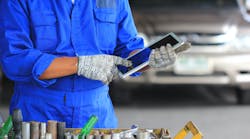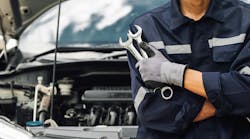Curry's Auto Service, one of the largest independent auto service and repair shops in the Washington, D.C., area, highlights its official position about its proprietary and innovative battery conditioning and rebuilding processes for hybrid vehicles on behalf of The Hybrid Shop (THS) and Automotive Research and Design (AR&D).
THS and AR&D's methodology, relating to servicing hybrid electric vehicle (HEV) systems, is rooted in sound technical methodologies, proven testing and diagnostic processes (that reflect standards utilized by the battery industry). In addition to upholding applicable industry standards, AR&D's 26 years of technical experience is focused on supporting hybrid electric vehicle systems and battery technology, according to a news release. These activities are led by AR&D Chief Technical Officer and recognized expert in hybrid vehicle technology, Mark Quarto. Quarto is a hybrid vehicle systems technologist and Electrical Engineer with over 28 years of experience in hybrid and electric vehicle propulsion and energy systems. Quarto's professional and vast field experience includes numerous technical contributions and management of research labs, service engineering and practical experience resolving field product performance concerns. In addition, Quarto is a patent holder in electric vehicle drive systems, a hardware and software developer, a curriculum developer and a technical instructor. His long standing professional memberships include SAE (Society of Automotive Engineers) International and IEEE (Institute of Electrical and Electronic Engineers), along with The Scientific Research Society (Sigma Xi).
The THS team is composed of experienced technicians, professionally trained and certified in hybrid battery conditioning. Our environmentally-friendly and cost-effective solution to HEV battery "conditioning" gives customers an alternative to costly battery replacement. Through scientific methods and by appropriately cycling the battery modules we can achieve up to 95 percent of its original energy (capacity) and power that results in extending the overall service life of the battery, thereby benefiting the customer, Curry's and THS reports.
It is the Electro-Chemical nature of a Nickel Metal Hydride (NiMH) battery to experience apparent capacity loss (ACL) which can significantly affect capacity and power during its service life. The aggressiveness and severity of ACL is influenced by geographic area (terrain), ambient temperature, drive cycle (highway vs. city vs. blended), frequency in which a car is driven, and the individual drivers style. Battery power can be affected by battery capacity and/or internal resistance, which is also tested and measured as part of the conditioning process, according to the release. As a result, these batteries can lose capacity and power that can eventually cause drivability issues including loss of horsepower, torque, and reduced fuel economy. Therefore, capacity and/or power will likely diminish in most NiMH battery cells over its service life. Similar to Nickel Cadmium (NiCad) technology, this is a well-known phenomenon with nickel-based batteries in the electro-chemical community; (many consumers have experienced this occurrence with cell phones, radio-controlled hobbies, power screwdriver tools, and other electrical/electronic devices). However, applying nickel based electro-chemical performance to HEV technology, is not well understood today in the automotive community.
In summary in the release, for most nickel based batteries to maintain proper balance, capacity, and power during its service life the process of conditioning the battery cell (conditioning = cycling with the proper process) will ensure that the battery will regain (most of) its designed operating performance. It is a well-known fact that NiMH can sustain 500-plus cycles (conditioning) to regain its capacity and power with the proviso that the batteries do not have electrolyte loss, have not performed in sustained periods of internal or external over-temperature conditions or been operated in an unbalanced or nearly discharged state.
The Hybrid Shop at Curry's Auto Service offers a 12-month/12,000-mile warranty. Whenever the driver experiences reduced performance, a check engine light (MIL), or, significant reduction in fuel economy, the battery conditioning process should be considered. However, this process should only occur after the basic vehicle systems have been eliminated as the cause for the symptom (e.g. proper engine operation, tire pressure, etc.). Based on the history of nickel based battery products, and how it can affect vehicle performance, battery conditioning should be considered as a maintenance procedure every five to seven years (on average) to restore the vehicle performance as close to the OEM's stated vehicle performance parameters as when the vehicle was purchased new if the vehicle is having any performance or significant fuel economy issues, the release states.
The Hybrid Shop at Curry's Auto Service can perform a comprehensive State of Health (SOH) check for approximately $499, which applies toward battery conditioning if needed. This SOH check includes:
• A complete Vehicle Performance Inspection
• Power and Energy Testing of battery modules
• Testing the Electric Transmission (Motor Generator Unit) for electrical and magnetic integrity, and aging (winding and insulation deterioration)
• Testing Power Invertor (motor control) System - wave form analysis and the current control regulation system
• DC to DC convertor output test (dc-dc component replaces traditional belt driven alternator).
It is THS' position that if a car is under warranty and the customer is not experiencing any problems, the vehicle likely does not need service. If the MIL illuminates and the car is under warranty the customer should go back to the OEM dealer and secure a warranty repair. If the car is out of warranty or a customer has an issue with a reduction of fuel economy, performance or drivability, THS can often service the vehicle, if necessary, for much less than a complete battery pack replacement, according to the release. Also, if the customer requests status of the battery pack SOH (capacity and power), testing can be performed, documented, and resulting data provided to the customer. For fleet customers (especially those with new vehicle warranties that may be significantly less than the normal consumer warranty period) THS offers a proactive predictive maintenance service program. This program monitors the SOH of hybrid high voltage system components, saving fleets costly down-time by trending and documenting the overall condition of these systems at periodic service intervals.
It is the official position of THS and AR&D that a majority of the out of warranty hybrid vehicle battery population can be serviced to restore battery capacity/power utilizing the conditioning (or rebuilding) process - as necessary - to extend the service life and performance of the hybrid system, the release states. This service can save customers 60-70 percent when compared to the cost of a new battery pack replacement and up to 50 percent when compared to purchasing a rebuilt battery pack. This positions THS as a service leader in Green Technology by reducing overall battery waste through a proactive, experienced, scientific approach to service and maintenance.
Subscribe to Motor Age and receive articles like this every month…absolutely free. Click here

